Can I get short-term disability for miscarriage? Can I get a FMLA leave after having had a miscarriage? Will I need a doctor’s note to take leave? What are my rights as an employee? We will try to answer all these questions in the article below.
Contents
Miscarriage is a devastating thing for a woman, and it can prevent her from functioning correctly in her daily life and in the workplace. In America, almost 26% of all pregnancies end in miscarriage. Miscarriage hurts a woman emotionally and physically.
So, it is better to take either vacation time, sick leave, or short-term disability leave while dealing with the emotional and physical pain caused by the miscarriage. Several federal, state and local laws protect this woman’s rights so that they don’t face any discrimination in the workplace before and after the miscarriage.
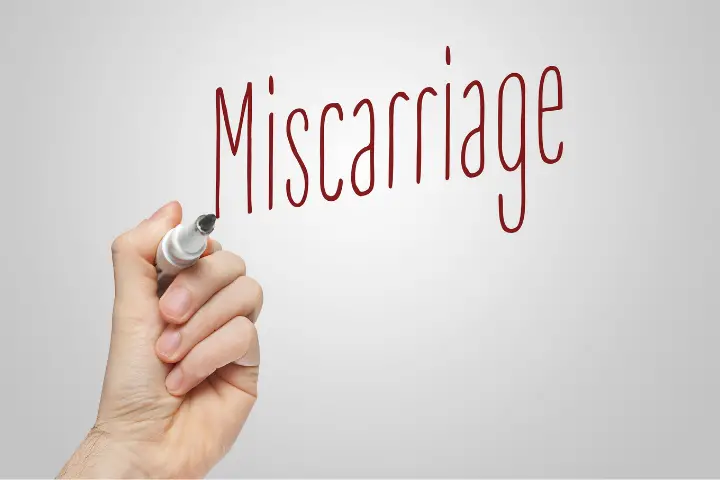
What is a Miscarriage?
Miscarriage, or spontaneous abortion, is the termination of the fetus’s body on or before 20 weeks. In the gestation period, a miscarriage usually occurs in the first trimester. Miscarriage has become a common issue in the last few years.
After having a miscarriage, medical attention is required immediately for the woman as the tissues of the fetal body need to be removed from the mother’s body. This procedure can be done with the help of medicines, or else the medical personnel will opt for the surgical removal of the fetal body.
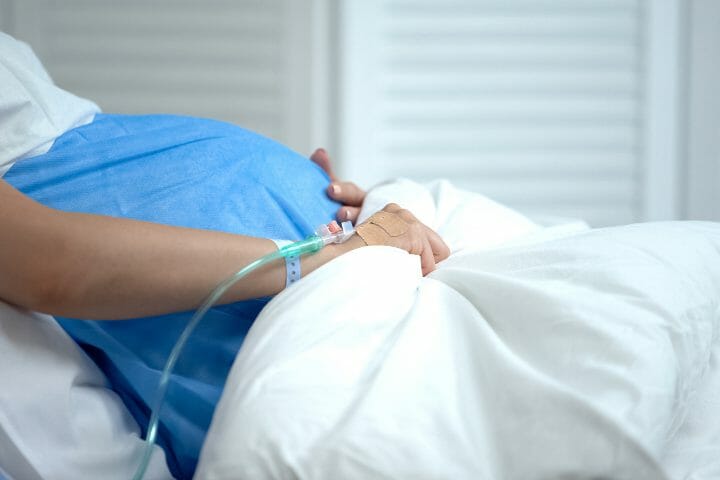
What causes miscarriage?
Several medical reasons can cause a miscarriage. Among the reasons, some of them are inevitable. It can happen due to genetic issues such as chromosome abnormalities, including problems such as Blighted ovum, Molar pregnancy, and Intrauterine fetal demise.
Other than that, conditions such as malnutrition, hormonal issues, trauma, drug or alcohol abuse, abnormalities in the cervix or uterus, and several other reasons can cause miscarriage in a woman’s body.
You might also like to read: Can You Get Disability For Thyroid Disease?
Is Miscarriage Considered as a Disability?
Without any doubt, miscarriage is a tragic incident and is capable of causing both physical and mental issues and complications in a woman’s body. If you have a miscarriage after the 20 week period, you might also be eligible for maternity benefits.
But the question here is whether miscarriage is a disability or not before the 20 week period? The answer is no. We will discuss below some recent developments in this regards.
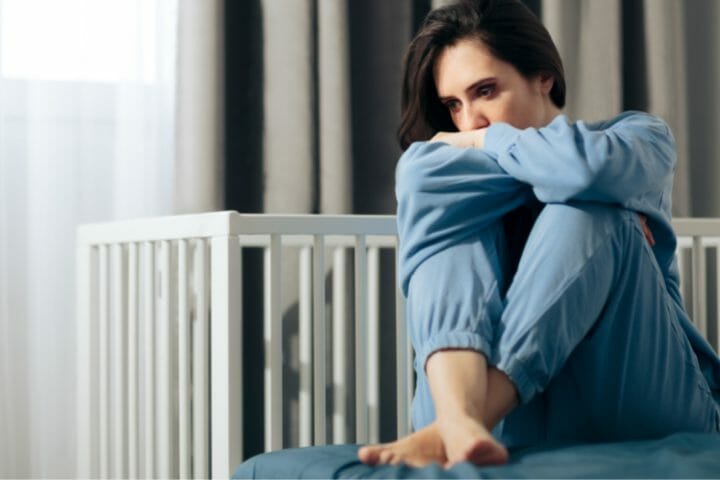
The Wenying Mou Case
In the recent past, a woman named Wenying Mou filed a case against her former employer for discrimination. She claimed that she had to leave the job while dealing with miscarriage and several other health issues.
The Ontario Human Right Commission, in an interim ruling, considered the miscarriage of Wenying Mou as a disability. The case is still under trial.
While there is no need to declare miscarriage as a disability, there is no doubt that job security and comfort need to be provided to women dealing with pregnancy and miscarriage.
To prohibit any discrimination based on pregnancy-related condition(which include miscarriage too) the Canadian Human Right Act is meant to protect similar human rights at the provincial level.
There are several cases where the women have won the case after being discriminated against and filing a lawsuit. None of them before this case in Ontario considered miscarriage as a disability.
The Flip Side of Calling Miscarriage a Disability
If miscarriage is defined as a disability, it might worsen the mental health of a woman who has been dealing with miscarriage-related mental health problems. If miscarriage is ruled as a disability, this might also affect the people having severe impairments, which are long-lasting compared to common ailments such as miscarriage.
Undeniably whether it is the first miscarriage or one of many, the loss is personal and devastating and is not made public by many due to the individual nature of the subject. But describing miscarriage will either enhance the rights of disabled people or will empower women more.
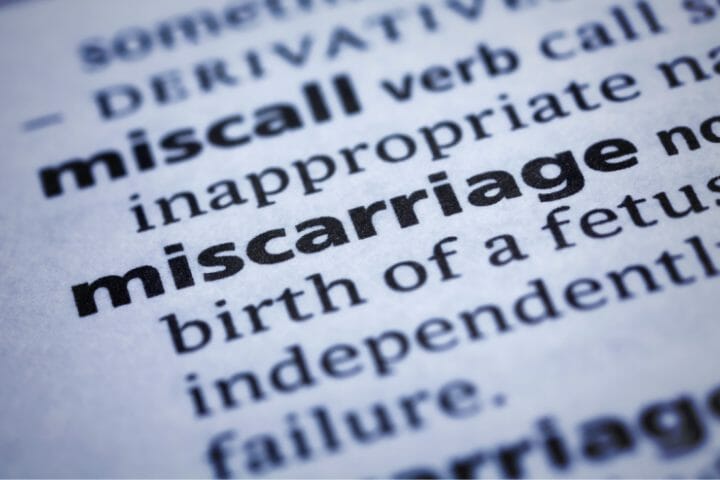
Leave After Having a Miscarriage or While Recovering From a Miscarriage
The Family and Medical Leave Act (FMLA) presents an opportunity for working women to take leaves without any pay to take care of their bodies. As per FMLA, miscarriage is a “serious health condition.” the body will go through some severe health issues after a miscarriage that needs to be addressed.
Specific requirements need to be fulfilled by a woman to take a leave after having a miscarriage. All of them are mentioned below.
- You should be working in a company where at least 50 other employees work with you.
- Your workplace should not be more than 75 miles away from your home.
- As an employee, you need to work for at least a 12-month period before the mishap, and in that year, you need to work for more than 1250 hours.
If an eligible employee fulfills all these requirements, then she can take a leave of a maximum of 12 weeks to recover from a miscarriage as per FMLA. You will need to file a claim with the US Department of Labor under the FMLA Law.
If your employer offer similar leave to people with temporary disabilities, but does not allow the same to you for your miscarriage, it is a strong reason for you to claim discrimination in the workplace.
If your state has a paid sick time law, you are also entitled to that. For example, if you reside in the state of New York, the law will treat miscarriage at par with temporary disability and offer you the same benefits, including paid leave up to 26 weeks.
Can FMLA CFRA be Used After Having a Miscarriage?
Federal Family and Medical Leave Law (FMLA) and CFRA (California’s Family Leave Law), present the right to take a leave while dealing with serious health issues to a woman.
Both these laws are made for medical leaves, so you need to submit a note from your doctor where your health issue will be mentioned in detail. The list of severe health issues includes miscarriage too.
Physical problems and mental issues such as anxiety and depression will also be considered, which are common after having a miscarriage.
The leave you will get with the help of the laws will be unpaid. That means you might take all the time in those 12 weeks to heal your body from the miscarriage, but you will not get any benefit from your employer.

Is There Any Need to Provide Details Before Taking a Leave?
Your employer has no right to enquire about the details regarding the miscarriage. They have to believe the doctor’s note. You can expect a leave without question being asked about the health issues you are dealing with.
The laws are made in such ways because it is natural that a female employee will feel uncomfortable while talking about a problem like a miscarriage. At this time, it is seen that a woman neither wants scrutiny nor the sympathy of another person, in this case, which is the employer.
Right to Bereavement Leave
A bereavement leave, also known as compassionate leave, is when an employee takes time off from the job while being paid. You can apply for bereavement leave after the death of one of your near and dear ones, such as your family members or friends.
No other federal law provides female employees with bereavement leave except for those working in Oregon. In this case, the law is a bit weak. Unlike the leaves that you can get with either FMLA or CFRA, the leave you will get under the right to grief will last three to seven days.
You might also like to read: Can You Get Disability If You’ve Never Worked?
What are the Medical Reasons That You Can Give For Short-Term Disability Benefits for Miscarriage?
You can get short-term disability benefits or leave for miscarriage. To qualify for this leave, a woman must need to have one or more of the following physical conditions.
- Thrombotic pulmonary embolism means clotting blood in the legs and the lungs.
- A problem with the movement of food in the bowel.
- Development of infections after the surgery.
- Hemorrhage
- Amniotic fluid embolism
Other than these physical health issues, mental health issues such as depression and anxiety, which can also prevent a woman from working correctly, can be the reason for the short-term disability post-miscarriage.
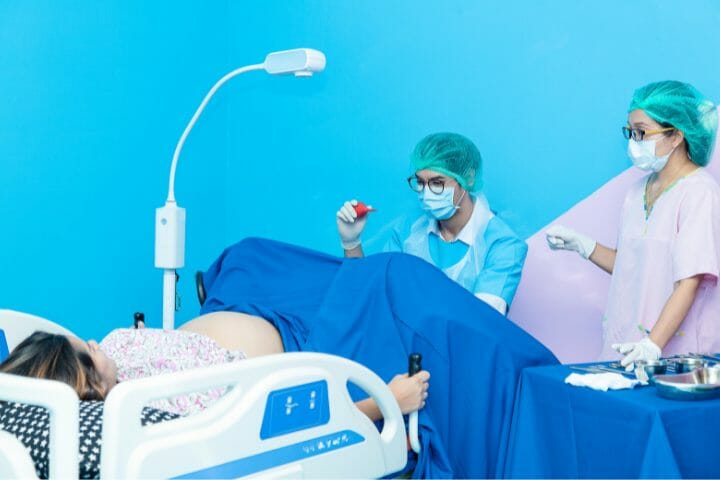
Can You Get a Postpartum Depression Disability Leave?
Postpartum depression is a medical condition capable of preventing you from joining your work. If a mother develops postpartum depression, she can get a postpartum disability leave.
Postpartum Depression and Social Security Disability
To qualify for SSDI or SSI, four of the following symptoms must be observed in the applicant:
- paranoia, hallucinations, delusions, or suicidal thoughts
- Feelings of emptiness
- Change in sleeping habits
- Lethargy and no physical activities.
- Challenges in connecting with the baby
- Loss of libido

Frequently Asked Questions
1. How long should you take off work after a miscarriage?
Every human body is different—the time off varies from person to person. After a miscarriage, you should take as much time as required to heal your body completely. You can consult with your doctor in this regard, and he will tell you how long you should take off work after a miscarriage.
2. Should you go to work immediately after a miscarriage?
The answer is no. You should not work after just having had a miscarriage. You need time to physically and mentally recover from a miscarriage. Several federal laws and state and local laws will provide you with the right to take time off if you are dealing with pregnancy-related issues, including miscarriage.
3. Is a miscarriage a severe health condition under FMLA?
Not only under the Federal Family Leave Law (FMLA) but also under California’s Family Leave Law (CFRA), a miscarriage is considered to be a severe health issue. Female employees can take leave while dealing with miscarriage and take time off as per the law.
4. Do you get paid leave after a miscarriage?
If you have applied for leave under the FMLA or CFRA, the leave you will get will be unpaid, but instead of that, if you applied for bereavement leave, you will get paid by the employer.
5. Can I get a sick note for a miscarriage?
Miscarriage is considered a pregnancy-related health issue, and if you feel that you require time off from your job, you can tell your doctor about this. The doctor can give you a sick note that you can show to your employer.
A Few Final Words
Taking care of your health is far more important than your job, and it is also your right to take a leave after dealing with a miscarriage. So, if you feel that you need to take some time off, take it and give time to your body to recover fully.
Thank you for reading the article. We hope we were able to answer the questions that you were searching for. If not, do write to us and we will try to help you in any other queries that you may have.
